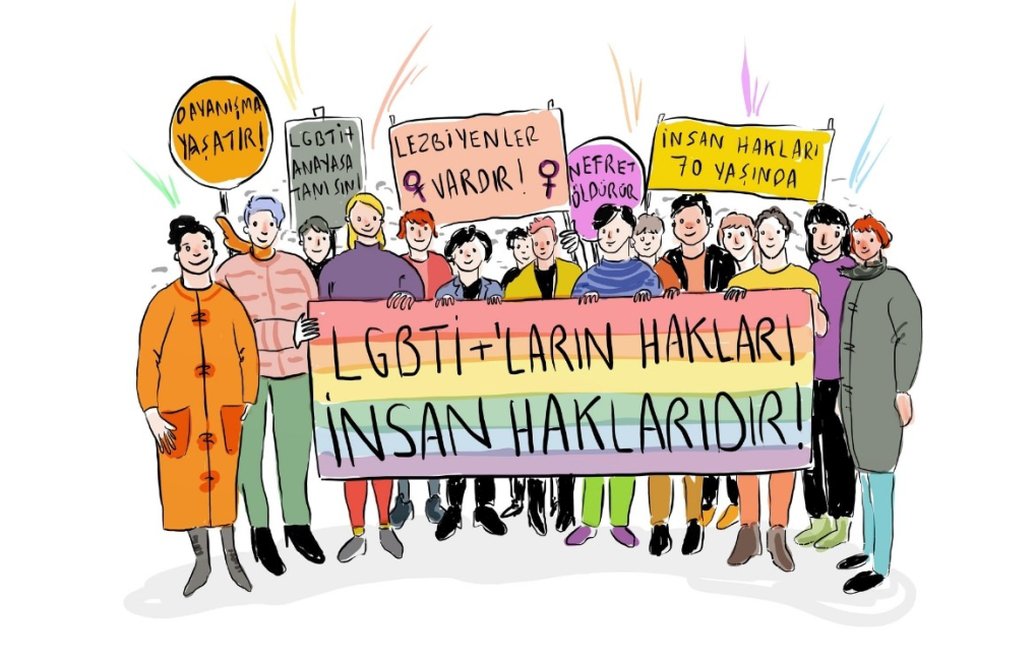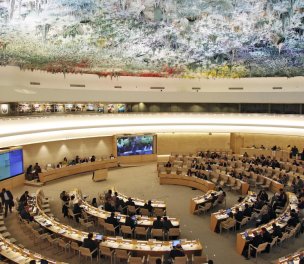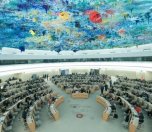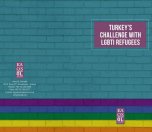* Image: Aslı Alpar
"LGBTI+ rights are human rights"
Click to read the article in Turkish
Deputy Minister of Foreign Affairs Faruk Kaymakçı has responded to the recommendations and criticisms expressed by 16 states about the LGBTI+ rights in Turkey. The states presented their recommendations during the Universal Periodic Review at the United Nations (UN).
CLICK - Universal Periodic Review of Turkey Starts
As reported by Kaos GL Association, Deputy Foreign Minister Kaymakçı has alleged that LGBTI+ community has the freedom of assembly and demonstration in Turkey.
However, in addition to the indefinite ban imposed on all LGBTI+ events in the capital city of Ankara for over two years now, pride parades have also been forbidden in İstanbul since 2015. Last year, pride weeks in the provinces of Mersin, İzmir and Antalya were banned. Queer Olympix sports events in İstanbul were not permitted, either.
Kaymakçı, on the other hand, has indicated that "LGBTI+s did 97 activities in 2017 and these activities were attended by 20 thousand people." Informing the countries that "119 people were detained during these activities due to violence", Kaymakçı argued, "There is no systematic ban."
Ban on application for pride parade also ignored
Last year, when the LGBTI+ community was not allowed to hold their pride parade in Taksim, they made an application to hold it in Bakırköy, one of the places designated by the Governorship as a site for meetings and demonstrations. However, even this application was rejected.
Kaymakçı has also ignored this ban in his speech. "As Galatasaray Square is a touristic site, the demonstrations of Saturday Mothers and LGBT community cannot be allowed there", Kaymakçı has argued.
In reference to the laws that do not openly promise protection for the rights of LGBTI+s, Kaymakçı has referred to the Article 10 of the Constitution, which stipulates that "everyone is equal before the law without distinction as to language, race, colour, sex, political opinion, philosophical belief, religion and sect, or any such grounds."
As claimed further by Deputy Minister Kaymakçı based on this article, the expression of "or any such grounds" comprises sexual orientation and gender identity and, "therefore, there is no need for sexual orientation and gender identity to be mentioned in other laws."
Even though the government has alleged that "all stakeholders" were consulted while Turkey's report to the UN was being prepared and in the process Human Rights Action Plan, none of the LGBTI+ organizations were reportedly contacted during these processes.
Kaymakçı: There is a struggle against hate crimes
With regards to hate crimes, Deputy Minister Kaymakçı has indicated that a legislation was introduced in 2014 and "a struggle has been waged against hate crimes in Turkey since then."
On the other side, according to the criteria of the Organization for Security and Co-operation in Europe (OSCE), Turkey has no primary or secondary legislation on hate crimes. The legislation mentioned by Kaymakçı does not have the expressions of sexual orientation or gender identity.
Moreover, according to the "Human Rights of LGBTI+ People in Turkey - Annual Review 2018" issued by Kaos GL Association, the ones attacked due to their sexual orientations or gender identities keep facing such attacks all through their lives and in all areas, including their own homes.
Like hate crimes targeting other social groups, the hate crimes against LGBTI+ community does not follow a particular political incident or does not occur in a relatively foreseeable manner. These crimes are not limited to the moments of attack and take different forms afterwards.
Victims are first threatened and harassed. Most of the time, there are several witnesses at the moment of incident. However, more than half of these witnesses do not show any reaction or do not intervene in the incident. (EMK/SD)
* Click here for the full report submitted by Turkey to the UN







